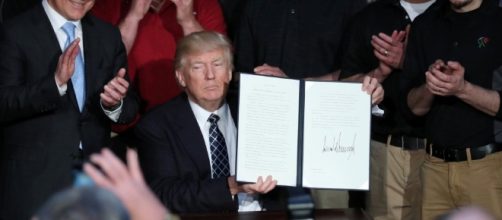Surrounded by a group of coal miners, the President of the United States on Tuesday began to dismantle essential elements of the environmental policies of his predecessor, Barack Obama. "We're going to put our miners to work again," President Donald Trump said Tuesday as he signed a new executive order.
The so-called Executive Order of Energy Independence suspends more than half a dozen measures promulgated by Obama and reinforces the use of fossil fuels. Trump, who pledged during his campaign to remove environmental regulations that he believes are damaging the economy, said that this measure would "reverse the government's intrusion" and "end the war on coal."
Changes that will occur
With Tuesday's executive order, Trump asks the Environmental Protection Administration (EPA) to reverse the 'Clean Power Plan,' powered by Obama in 2014.
This policy obliged states to limit carbon dioxide emissions in coal-fired power plants.
- The new Trump measure eliminates the moratorium that prevented the use of federal land for the extraction of coal.
- It also prompts new and less restrictive regulations on methane emissions from crude oil and gas production.
- Finally, it eliminates the requirement for federal agencies to consider the impact of climate change when analyzing the environmental projects of the future.
Who benefits?
The president has not spoken precisely about how many jobs his government will create with this new implementation. By 2015, coal companies employed about 66,000 miners, the lowest number since the U.S. Department of Energy's statistical agency began to record these figures in 1978.
This is due to increased mechanization in the industry and increased natural gas production, a less expensive and polluting alternative to coal, as explained by several experts.
Trump also said Tuesday that the measure would benefit the country to achieve "energy independence" by reducing imports of fossil fuels.
Trump's environmental strategy
One of the fears of the new measure is that the United States fails to meet the commitments made under the climate change agreement signed in Paris in December 2015. The landmark agreement commits governments to diversify their economies away from fossil fuels and reduce carbon emissions.
But President Trump criticized the Paris Agreement during the election campaign, and now, with his new executive measure, he opens the door to increased CO2 production.

